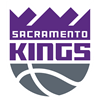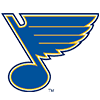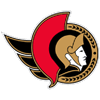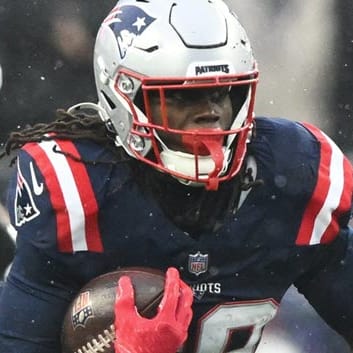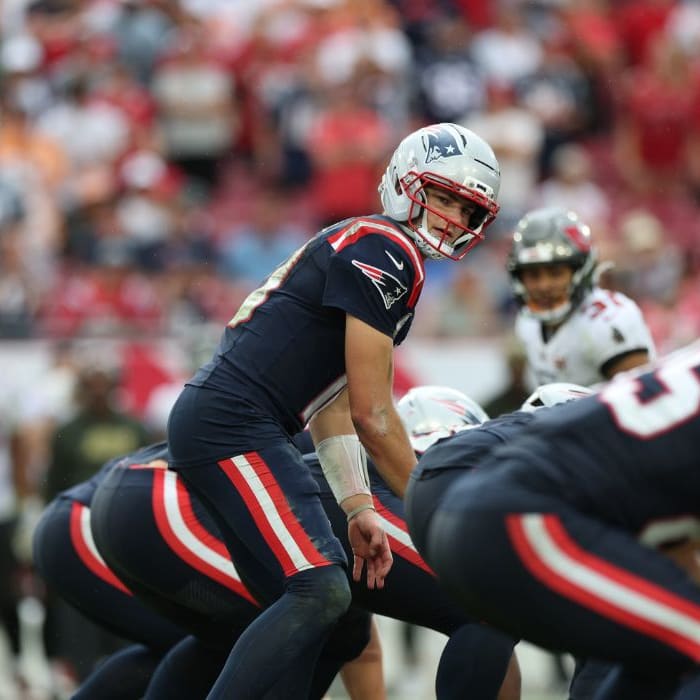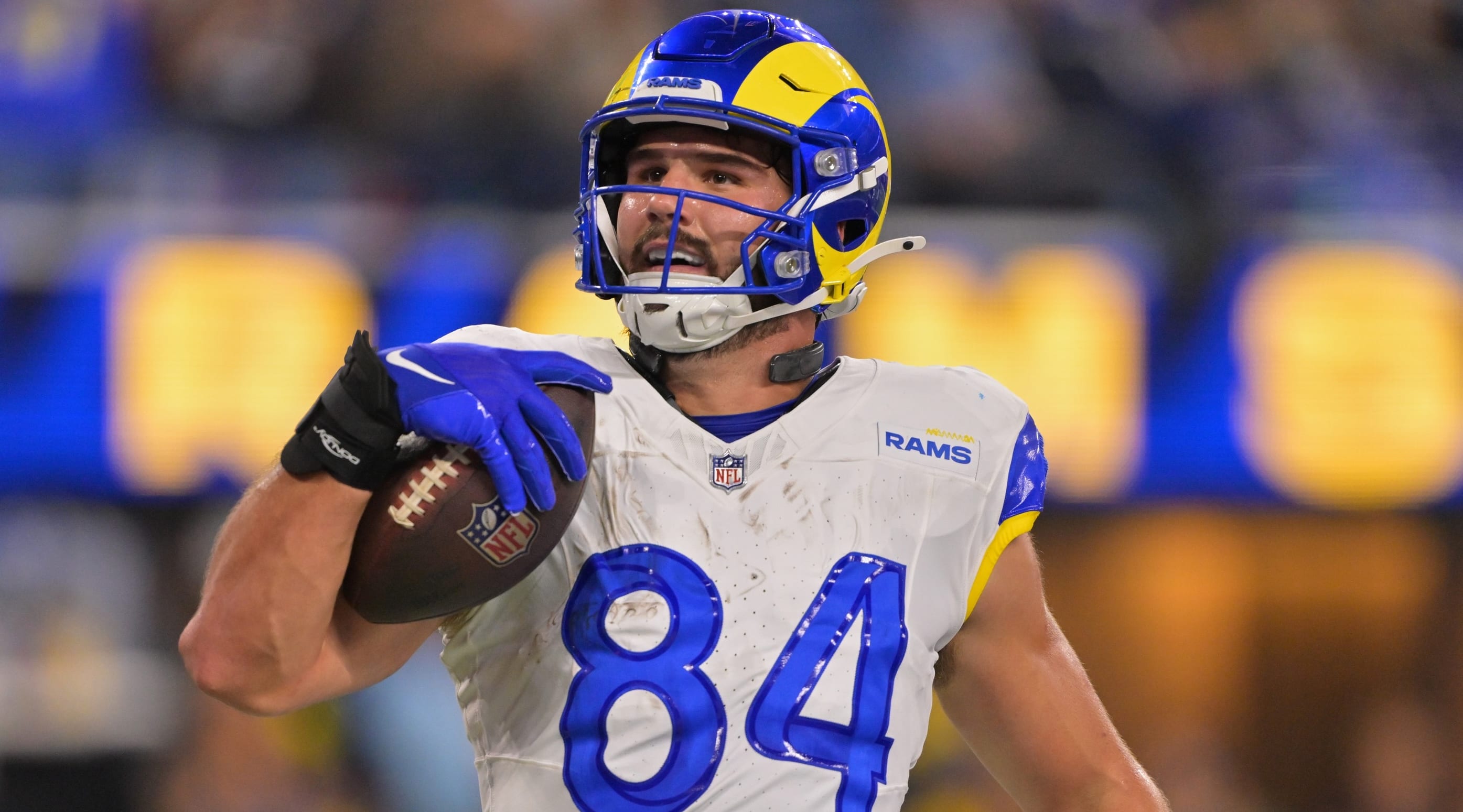This will be a two-part series taking inventory of the training camp job battles occurring at running back, wide receiver and tight end. This entry will look at the running backs.
In each case the candidates in question are listed, but some cases have have clearer favorites/underdogs than others. If a player's name is struck through they are assumed to be among the underdogs.
Arizona RB2: Keaontay Ingram vs. Corey Clement vs. Ty'Son Williams
Arizona could still add a free agent like Kareem Hunt or maybe even Dontrell Hilliard (neck), but among the in-house group it's obvious that Keaontay Ingram is the best Arizona running back behind starter James Conner. Corey Clement is an aging practice-squad type with poor athleticism and a nasty injury history, while Ty'Son Williams is just a camp body type – one the Ravens ran out of town when forced to play Williams in light of injuries to J.K. Dobbins and Gus Edwards.
Ingram only has average long speed, but at 221 pounds he offers both anchor power and volume as a ballcarrier. Ingram has additionally shown well as a pass catcher, and his short-area athleticism is good, especially for a heavier running back. Ingram showed his power on a preseason touchdown run against Kansas City, breaking away from mauler Chiefs linebacker Leo Chenal, who rarely misses tackles and had Ingram squared up.
Verdict: It's Keaontay Ingram or it's nobody currently on the Arizona roster.
Baltimore RB3: Justice Hill vs. Keaton Mitchell
This
This will be a two-part series taking inventory of the training camp job battles occurring at running back, wide receiver and tight end. This entry will look at the running backs.
In each case the candidates in question are listed, but some cases have have clearer favorites/underdogs than others. If a player's name is struck through they are assumed to be among the underdogs.
Arizona RB2: Keaontay Ingram vs. Corey Clement vs. Ty'Son Williams
Arizona could still add a free agent like Kareem Hunt or maybe even Dontrell Hilliard (neck), but among the in-house group it's obvious that Keaontay Ingram is the best Arizona running back behind starter James Conner. Corey Clement is an aging practice-squad type with poor athleticism and a nasty injury history, while Ty'Son Williams is just a camp body type – one the Ravens ran out of town when forced to play Williams in light of injuries to J.K. Dobbins and Gus Edwards.
Ingram only has average long speed, but at 221 pounds he offers both anchor power and volume as a ballcarrier. Ingram has additionally shown well as a pass catcher, and his short-area athleticism is good, especially for a heavier running back. Ingram showed his power on a preseason touchdown run against Kansas City, breaking away from mauler Chiefs linebacker Leo Chenal, who rarely misses tackles and had Ingram squared up.
Verdict: It's Keaontay Ingram or it's nobody currently on the Arizona roster.
Baltimore RB3: Justice Hill vs. Keaton Mitchell
This role will likely be of little consequence given the presences of J.K. Dobbins and Gus Edwards on the depth chart, but the two have had their injury issues in the past. Justice Hill is the favorite to emerge as the third runner behind those two, and though fragile at the NFL level Hill mostly held up as a workhorse at Oklahoma State in college. The real question might be whether the Ravens hold four running backs rather than three, in which case the undrafted rookie Keaton Mitchell can get his foot in the door. Hill is fast, but Mitchell is much faster yet and could be an interesting big-play threat off the bench.
Verdict: Justice Hill is likely Baltimore's RB3, but Keaton Mitchell and his speed might be too tantalizing to cut and could hang around to complicate matters.
Cincinnati RB2: Chris Evans vs. Chase Brown
Chris Evans is the current favorite to serve as Cincinnati's passing-down specialist at running back, a role previously held by Samaje Perine. Evans is likely a good passing-down option due to plus blocking and pass-catching ability, but whether he's viable in other situations is less clear. Evans (5-foot-11, 215 pounds) is a little bigger than Chase Brown (5-foot-10, 211 pounds) but also significantly slower (4.52 pro day 40 for Evans, 4.43 combine 40 for Brown) and a worse pure runner.
Evans' abilities on passing downs will be difficult to outdo, but in the event that the Bengals need someone to run the ball it's clear that Brown has an advantage over Evans.
Verdict: Chris Evans could be difficult to displace on passing downs, making Brown close to useless in games where Joe Mixon is healthy. If Mixon were to miss time, though, then Evans' limitations as a runner would begin to matter, raising the need for Chase Brown to step in and pick up the substantial slack Evans cannot. Evans, in other words, might be the RB2 in the sense that he's the first running back off the bench, but Brown might be the handcuff and the first potential starter off the bench. Not just that, but Brown is a gifted receiver and could press Evans for those reps in time, too.
Chicago RB2: D'Onta Foreman vs. Roschon Johnson vs. Travis Homer
D'Onta Foreman and Roschon Johnson are the two favorites to push for usage behind the starter Khalil Herbert. At around 210 pounds Herbert probably isn't a true workhorse candidate – he never took on such workloads in his otherwise distinguished college career at Kansas and Virginia Tech, anyway – so there could be substantial slack for the other Bears runners to pick up.
When it comes to pure rushing there's no ambiguity about the fact that Foreman is the top option after Herbert. Foreman ran for almost as many yards in one season at Texas (2028 yards and 15 touchdowns at 6.3 YPC) as Johnson did in four (2,190 yards and 23 touchdowns at 5.6 YPC). Foreman finished his career with an average of 6.4 yards per carry at a touchdown percentage of 4.6 over 431 carries, while Johnson finished with an average of 5.6 yards per carry at a touchdown percentage of 5.9 over 392 carries. Johnson's higher touchdown rate alleviates the YPC gap somewhat, but not meaningfully so. Plus, Johnson saw most of his playing time against backups and/or in blowouts, whereas Foreman was a workhorse starter and the primary concern of opposing defenses.
Foreman is not proven as a passing-down option, however, and Johnson likely has an advantage there, certainly as a pass catcher at the very least. The Athletic beat writer Adam Jahns wrote that 'it would not be surprising' if Chicago cut Foreman, but in that case it's a wonder (A) why Jahns wouldn't simply predict Foreman's release and (B) why the Bears would cut a player they've already paid $1 million to just invite the problem of running back depth.
Even if Foreman is ran off, the problem for Johnson in this scenario is that Travis Homer is already a proven plus passing-down option at the NFL level, and he's more gifted than Johnson from scrimmage, too. Johnson definitely offers more power and volume upside than Homer, who hovers around a mere 200 pounds, but Homer's ability with the ball on a given play is pretty clear.
Verdict: D'Onta Foreman, Roschon Johnson and Travis Homer are capable of making meaningful contributions to the Bears offense, at the expense of each of the others, and even Herbert. Foreman is clearly the best runner of the three, though likely outdone in passing situations by Johnson and Homer. Johnson has a power and volume advantage over Homer but not one in terms of pass blocking or general ability from scrimmage.
Dallas RB2: Rico Dowdle vs. Deuce Vaughn vs. Ronald Jones vs. Malik Davis vs. Hunter Luepke
This is a mess. Rico Dowdle appears to have the inside track to a roster spot over Malik Davis, as Dowdle was ahead of Davis last year before Dowdle landed on IR. Davis was widely assumed to be the top backup to Tony Pollard, but that appears to be well disproved by now.
If Dowdle is ahead of Davis then it invites more questions, if only because Dowdle has a horrendous history as a pass catcher and fumbler. Dowdle is evidently valued by Dallas for his special teams ability and raw talent as a runner, and in these capacities Dowdle seems to have some real momentum going for him, but a backup who fumbles and can't play passing downs is a backup who can never start.
Deuce Vaughn is maybe the single greatest complicating factor, because the rookie sixth-round pick has continued to display the intoxicating ability from scrimmage that he showed at Kansas State. At 5-foot-5 Vaughn has no precedent as more than a rotational player, yet he held up easily under mammoth workloads in college. All conventional wisdom says a player like Vaughn is borderline impossible, yet all he's done to this point is emphatically prove himself immune to convention.
None of this is to account for Ronald Jones, who is definitely a better pure runner than any non-Pollard, non-Vaughn running back on the roster, yet Jones is facing a two-game suspension for using a banned heart medication. Not just that, but fullback tweener Hunter Luepke looks like Mike Alstott at times.
Verdict: Tony Pollard can't take on the rushing volume that Ezekiel Elliott did, especially between the tackles, so Dallas might have carries to distribute to its backup runners as Pollard presumably keeps a full-time workload in passing situations. That suits Deuce Vaughn, Rico Dowdle and Ronald Jones, though each of the three has limiting factors – size in Vaughn's case, fumbling/pass-catching in Dowdle's case, and a suspension in Jones' case. Malik Davis has no obvious use in the group, especially if Hunter Luepke makes the team as an additional passing-down viable player.
Indianapolis RB2 (RB1?): Deon Jackson vs. Zack Moss vs. Evan Hull
All three of these running backs are capable players with three-down skill sets. All three also have histories of providing plus efficiency over high workload volumes, which speaks to their ability to hold up with usage at the NFL level. Zack Moss has had a lot of injury trouble over the past four years despite his burly frame, so he might be seen as the least durable between himself, Deon Jackson and Evan Hull.
Moss will likely miss the first few games of the season due to a broken arm suffered in training camp, an injury which opened the door for Jackson and Hull to prove themselves more. As much as it's easy to make a positive case for both players as a result, it's difficult to find how one gets any leverage on the other in a zero-sum game. The team might identify the veteran Jackson as the preferred option over the rookie fifth-round pick Hull, but it's unlikely that Hull will fail with whatever usage they give him otherwise, raising the concern of the Hot Hand approach between equals.
Jackson is arguably the most unique of the three players because he has more anchor than Hull (218 pounds versus 209), and Jackson's 4.42-second pro day 40 at least matches Hull's 4.47-second combine 40.
Verdict: If Jonathan Taylor is traded or otherwise unavailable then the Colts will have three similarly competent options between Deon Jackson, Evan Hull and Zack Moss. Moss being the slowest of the three and returning from a broken arm might have set him behind the other two, at which point it's difficult to make a definitive distinction between Jackson and Hull. If there is one to make then it's the fact that Jackson offers more power anchor at nearly ten pounds heavier than Hull at the roughly same speed.
Los Angeles Chargers RB2: Joshua Kelley vs. Isaiah Spiller
Joshua Kelley is the incumbent backup to Austin Ekeler and the favorite to head into 2023 in the same role. This is a policy failure on the part of the Chargers if so, because Kelley is quite simply a leak in the boat.
Competent pass blocker or not, Kelley brings the offense down by averaging less than 1.5 yards from scrimmage per snap, a return informed by a career rushing average of less than 3.5 yards per carry. Kelley's career pass-catching returns are also poor at a catch rate of 77.8 percent and 5.3 yards per target. Austin Ekeler averaged 4.5 yards per carry in the same stretch while catching 80.8 percent of his targets at 6.2 yards per target, good for 2.3 yards from scrimmage per snap. When Ekeler leaves the field the Chargers offense stops, and that's a fact.
The one thing that could change that fact is the potential emergence of 2022 fourth-round pick Isaiah Spiller, who spent almost all of his rookie season on the bench behind Kelley and the similarly useless Sony Michel. Granted, Spiller was not memorably effective with his brief usage, producing just 41 yards on 18 carries and catching his three targets for 13 yards on 53 snaps, but there are at least a couple things to keep in mind. Spiller's production might have been poor last year but (A) it's a tiny, meaningless sample size and (2) Spiller was very young at the time, having just turned 21 in the second week of August in 2022. Even now, at recently-turned 22, Spiller is still nearly a year younger than Kelley was in his own rookie season. Any advantage Kelley has over Spiller is clearly due to a combination of inexperience and perhaps fallibility on the part of Brandon Staley.
Even if Spiller turns out to be something of a bust of a fourth-round pick, it's a near certainty he will be a significantly better player than Kelley at some point. Perhaps that point doesn't occur within the 2023 season, but if it doesn't the Chargers are in trouble.
Verdict: Joshua Kelley is the favorite to back up Austin Ekeler once again, but he is capable of nearly nothing from scrimmage. If Isaiah Spiller can't displace Kelley then the Chargers simply have the worst running back depth in the league – a bad thing for an offense desperately dependent on running back production.
Minnesota RB2: Ty Chandler vs. DeWayne McBride vs. Kene Nwangwu
Alexander Mattison is the clear starter for Minnesota, a fact made clearer by the consistent discontent the team has shown toward Ty Chandler, who's otherwise penciled in as the top backup for Week 1. Chandler is fast (4.45-second combine 40) but light (204 pounds), and his processing isn't as fast as his feet. Chandler's returns as a runner in college (5.2 YPC over 603 attempts) lag behind what his athletic tools would lead you to project, indicating a processing deficit or a lack of some intangible trait that escapes testing – balance, stop/start, change of direction – something along those lines.
With that said, Chandler is comfortable playing passing downs both in terms of blitz pickup and pass catching. The opposite would be the description for the rookie seventh-round pick DeWayne McBride, who boasts heaps of unrefined raw running ability, yet is starting from Square One for passing-down purposes after almost never playing passing downs at UAB. Kene Nwangwu, meanwhile, is likely just a kick returner.
It's possible the Vikings are not pleased with any of Chandler, McBride or Nwangwu as the potential backup to Mattison. Chandler's best abilities – his pass-catching and blitz pickup – are largely a waste on this depth chart because Mattison is superior in both regards and, unlike Chandler, can run with volume in base functions. The Vikings had Kareem Hunt in for a visit, and it wouldn't be shocking if, rather than someone to redundantly take passing-down reps for Mattison, they instead wanted someone better at rushing than Chandler. Whether Hunt satisfies that definition is another question, but if this is the basic issue at hand then it's an ongoing liability for Chandler specifically relative to McBride.
Verdict: Ty Chandler can play passing downs but not rushing downs. DeWayne McBride is a much more talented pure runner – more talented than Mattison even – but completely undeveloped for passing-down purposes. Kene Nwangwu has always been incredibly fast but has never earned playing time at running back, be it in the NFL or at Iowa State, and that's unlikely to change. The Vikings could sign someone like Kareem Hunt or Dontrell Hilliard (neck).
New York Giants RB2: Eric Gray vs. Matt Breida vs. Gary Brightwell vs. James Robinson
Unfortunately for James Robinson, by most accounts his knee is deteriorating to the point that he can barely play anymore. This battle is realistically limited to just 2022 incumbent backup Matt Breida, 2022 third-stringer Gary Brightwell, and rookie fifth-round pick Eric Gray.
Breida played 249 snaps last year, turning 54 carries into 220 yards (4.1 YPC) and one touchdown while catching 20 of 25 targets for 118 yards. Both returns were abysmal, and not easily accepted. With that said, Brightwell is little more than a glorified special teams player, and thus unlikely to threaten Breida.
Gray might be a rookie but he's more polished than most rookies after playing a great deal throughout his three years at Tennessee and one year at Oklahoma. Gray has a three-down skill set and shows above average ability from scrimmage both as a runner and pass catcher. Gray plays a rugged game and knows how to cut through heavy traffic repeatedly over a big play count. The problem is that at 207 pounds Gray is not guaranteed to hold up in a starting role at the NFL level. The hope of course is that no such demands are placed on Gray, because Saquon Barkley would ideally stay healthy and keep Gray in a backup role.
Verdict: There is nothing to find here between Matt Breida or Gary Brightwell. The rookie fifth-round pick Eric Gray offers something new between the three, which is to say reliable three-down ability and a balanced skill set throughout all running back situations. Gray is not a strong volume candidate at under 210 pounds, however, and he isn't explosive enough athletically to project for reliably plus efficiency at the NFL level.
Philadelphia RB1: D'Andre Swift vs. Rashaad Penny vs. Kenneth Gainwell
Reports from Philadelphia training camp consistently claim Kenneth Gainwell is the starting running back for the Eagles, but similar reports surfaced last year and the result was Gainwell barely playing while Miles Sanders offered RB2 utility in fantasy.
Gainwell cannot run anywhere near as effectively as D'Andre Swift or Rashaad Penny. That's not an opinion. The Eagles are free to place a value emphasis on other considerations, but as far as that one question goes there's no question at all. Penny is faster than Gainwell at 20 pounds heavier, and Penny's history both in college and the NFL make clear he's a top-10 pure rushing talent. Swift isn't quite as notable in that regard but still a standout in his own right, boasting superior speed to Gainwell at 10 pounds heavier and logging a career NFL rushing average of 4.6 yards per carry over 364 carries.
Penny is limited as a pass catcher, meanwhile, especially compared to two standout receivers like Swift and Gainwell. The problem for Gainwell in this case is that the Eagles don't really throw to the running back position – for Jalen Hurts to run so much is at the direct expense of usage that might be running back targets. If there's no structural room for running backs to catch passes in base functions, then Gainwell has no way to get his foot in the door. Swift is not hurt so much by this fact because he's a standout pure runner, and one easily superior to Gainwell.
Verdict: All Eagles running backs will play, but Rashaad Penny and D'Andre Swift are the best runners, a fact completely beyond dispute. Kenneth Gainwell is a standout pass catcher, but not necessarily better in this capacity than Swift is, and the whole question might be moot given the lack of pass-catching infrastructure for running backs in the Eagles' offensive scheme. Both Swift and Penny have lengthy injury histories, so the odds of anyone taking over the backfield for more than a game at a time are not favorable.
Tampa Bay RB2: Chase Edmonds vs. Ke'Shawn Vaughn vs. Sean Tucker
Rachaad White is the definite RB1 for Tampa going into the year, but he faces questions about nearly every consideration and might be at risk of losing some playing time to his backups. Chase Edmonds might even be a candidate to immediately claim the majority of Tampa's passing-down situations, or at least ESPN reporter Jenna Laine predicted that Edmonds would be the team's primary third-down back. Edmonds is likely harmless to White as a runner, though, and indeed Edmonds might be the worst pure runner of all the Tampa Bay running backs options.
With that said, even if Ke'Shawn Vaughn is a better pure runner than Edmonds that's (A) not saying much and (B) probably not enough to make him a real complicating factor. More dangerous than Vaughn is Sean Tucker, the undrafted running back out of Syracuse. Tucker went undrafted for unspecified health concerns, not ability reasons. If Tucker had a clean bill of health he likely would have been a fourth or fifth-round pick, and of a general prospect grade comparable or equal to what White was out of Arizona State last year.
Verdict: Chase Edmonds might be Tampa Bay's primary third-down back but is unlikely to take much in the way of rushing. Ke'Shawn Vaughn seems incapable of anything. Sean Tucker has the most overall ability of the three, but a perplexing projection given his undisclosed health concerns.
Tennessee RB2: Tyjae Spears vs. Julius Chestnut vs. Hassan Haskins
Haskins remains on the Tennessee roster heading into final cuts, but it remains to be seen whether the 2022 fourth-round pick makes the team following a June arrest for felony aggravated strangulation, but Haskins was an ill-advised draft pick to begin with and might have gotten cut on merit even if not for his disturbing off-field situation.
While Haskins was at one point listed with special teams specialist Jonathan Ward as second on the depth chart to Derrick Henry, the expectation all along was that Haskins (and Ward) would get passed up by Tyjae Spears, a third-round 2023 selection out of Tulane. Spears can only take on so much volume at 195 pounds, but he's an off-the-bench firecracker who could provide Tennessee with big plays while Henry gets a breather.
Whereas Spears over Haskins was a foregone conclusion all along, the additional question is whether Haskins will get jumped by Julius Chestnut as well. Chestnut is nowhere near as explosive as Spears, but the 2022 undrafted free agent matches Haskins' one conceivable selling point, which is power and workhorse ability at nearly 230 pounds. Chestnut has been exceptional in the preseason, turning 20 carries into 144 yards.
Verdict: Tyjae Spears will almost certainly be the first Titans running back off the bench. In the event that Derrick Henry were unavailable, though, Spears would like split snaps with at least one of Julius Chestnut or Hassan Haskins. A 2022 draft reach with a felony domestic violence charge hanging over his head, Haskins might or might not hold off Chestnut.
Washington RB1: Brian Robinson vs. Antonio Gibson
Brian Robinson is a beloved player and doubtlessly a good culture contributor to a productive locker room, but whether that's enough to make him a starter for new coordinator Eric Bieniemy is less clear. Robinson will likely get the first shot to start as a likable incumbent, but being likable becomes less of a consideration the more time passes without results. There's no evidence that the results will ever be there with Robinson.
Although he plays hard and works with great focus, Robinson is at a major talent disadvantage to not just Antonio Gibson but even rookie fifth-round pick Chris Rodriguez, who is an outside candidate to displace both Robinson and Gibson by the year's end if the veteran backs don't show more.
Gibson has posted poor rushing returns in the last two years, turning 407 carries into just 1,583 yards and 10 touchdowns, yet that average of 3.9 yards per carry and touchdown percentage of 2.5 were still not outdone by Robinson, who averaged 3.9 yards per carry with a touchdown percentage of 1.0 despite getting big volume against an incredibly easy schedule. Robinson is at best an equally good runner as Gibson, yet Gibson is unambiguously the far superior receiver. When Robinson plays it tips off the play call more than when Gibson is on the field, and there's no positive tradeoff whatsoever because Robinson still doesn't outdo Gibson as a runner.
Verdict: There's no accounting for team/coach fallibility, but Brian Robinson has the profile of an RB3 or practice squad type. Gibson, flawed as he might be, is a far superior receiver to Robinson and no worse as a runner. That's a conservative statement – Gibson is almost certainly the better runner of the two also – and Robinson will never produce as well as a runner as Gibson did in his rookie year, the first he ever played at running back. Gibson ran for 795 yards and 11 touchdowns on just 170 carries (4.7 YPC). Then again Chris Rodriguez is the most talented pure runner of the three and threatens the carry usage of both Gibson and Robinson.








